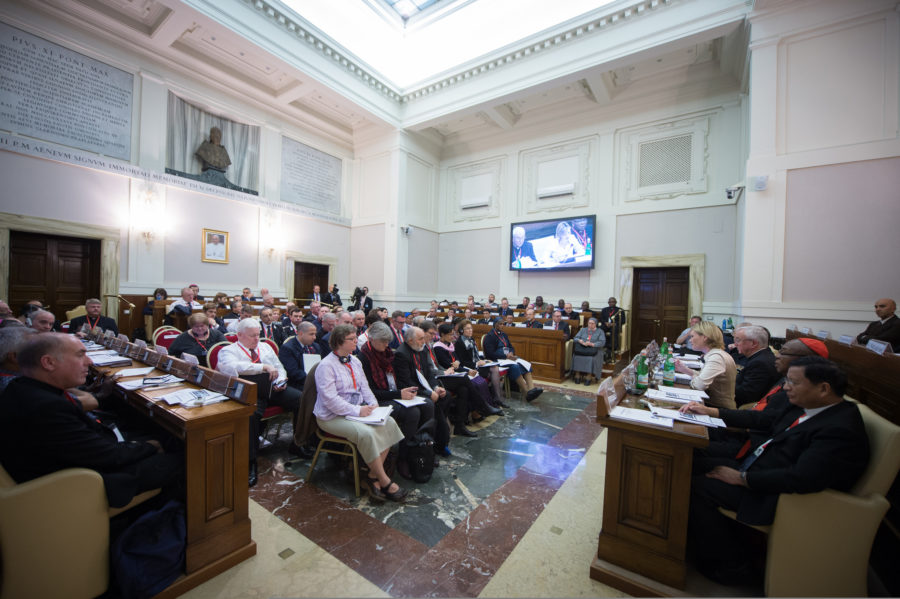
On 27 October the Embassy hosted a visit by the Home Secretary, Amber Rudd, who was at the Vatican to attend a meeting of the Santa Marta Group, a gathering of police chiefs and bishops on preventing human trafficking and modern slavery. This issue is a top priority for the UK, and for Pope Francis. In 2014, the UK Prime Minister Theresa May launched the Santa Marta Group at the Vatican as Home Secretary, and has spoken often of the need to combat these crimes. The Pope again showed his commitment by addressing the Group – and shaking the hand of each of the 100+ participants!
The Santa Marta Group conference gave an insight into both the problems and the possible solutions to human trafficking. Three victims told their stories. One had been tricked into travelling from Nigeria, and then obliged to work as a prostitute in Italy to pay back the extortionate price charged by the people smugglers. Another lady had worked in domestic slavery in the UK, and had been sold from one employer to another. A third young man had been lured from Guinea with the promise of a footballing contract only to find he was in fact expected to work as a sex worker. His story had a happy ending: he eventually played football for Watford. Hearing victims’ stories injects reality into the term ‘modern slavery’. It is shocking that such things go on in our own country.
The Church is often the place to which victims turn, which provides them with support and helps them escape from the exploitation which they are suffering. The victims made clear that they trust the Church in a way that, initially at least, they do not trust other authorities. At the conference there were a number of inspiring religious sisters who have done excellent work with victims – such as Sister Eugenia Bonetti, who founded the association ‘Slaves no more’ and works to reintegrate Nigerian prostitutes; and Sister Gabriella Bottani, coordinator of the Talitha Kum international network of religious sisters working against trafficking.
The police chiefs at the conference were inspiring too, with many of them obviously very personally committed to fighting trafficking. We heard accounts from Argentina to Ireland, from Nigeria to Burma of action to fight this crime in the many places in which it takes place – factories, fields, brothels, at sea, and in private houses. Perhaps particularly heartening was the presence of organisations such as Europol and the International Organisation for Migration that can spread best practice and take practical steps to stop traffickers at the international level. Many of the participants spoke of the need to cut off demand for slave and trafficked labour in recipient countries.
The Home Secretary set out the UK’s ground-breaking action to tackle modern slavery, including the Modern Slavery Act, the appointment of Independent Anti-Slavery Commissioner Kevin Hyland, and work on transparency in supply chains. She announced an £11m Modern Slavery Innovation Fund that would be used to support projects in high-risk countries from which victims are trafficked to the UK. She also announced that the £3m Child Trafficking Protection Fund was open for bidders. She described how she had committed additional funds to the police to bring perpetrators to justice and outlined the role of the Prime Minister’s new taskforce. The Home Secretary praised Pope Francis’ leadership as being “exactly what we need” to tackle modern slavery.
A highlight of the conference was of course the audience with Pope Francis. He said that modern slavery remained one of the major challenges of our time, and that concerted action was needed to eliminate root causes, but also to assist and accompany victims in their rehabilitation.
The Santa Marta Group must be unique: bishops and police chiefs identifying a common goal and seeing what they can learn from each other and how they can help each other. As many speakers showed, they are making a real difference to victims. The UK will continue to support their work – and look for ways of spreading their expertise even further. On a wider perspective, the Santa Marta Group is an excellent example of how Catholic and faith networks can support us to deliver foreign policy objectives, also in other areas such as climate change, conflict resolution, countering violent extremism, human rights, and combating poverty.
